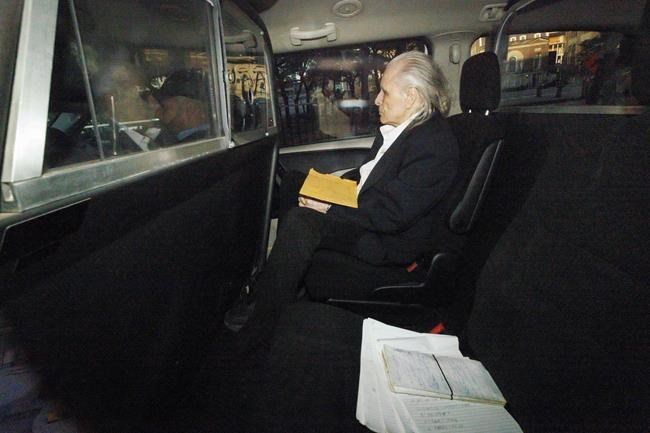TORONTO — Peter Nygard, the former Canadian fashion mogul who was found guilty of four counts of sexual assault, could face up to a decade or more behind bars as an Ontario court hands down a sentence expected to "set the tone" for similar cases in the future, an Ontario legal expert said.
Nygard, 82, was found guilty of those charges on Sunday, but was acquitted of a fifth count, as well as a charge of forcible confinement. The charges stemmed from allegations dating back from the 1980s until the mid-2000s.
His sentencing date is to be set later this month. Nygard's defence lawyer has said he is considering whether to appeal the verdict.
Five women testified during trial that they were invited to Nygard's headquarters at 1 Niagara St. in Toronto under pretexts ranging from tours to job interviews, with all encounters ending in a top-floor bedroom suite where four of them were sexually assaulted. The women's identities are protected under a standard publication ban for complainants in sexual assault cases.
The "main tension" at Nygard's sentencing will likely be between mitigating factors such as his advanced age and health conditions, and aggravating factors such as the number of victims and the nature of the offences, as well as whether he held a position of trust or power over some of the women, said Stephanie DiGiuseppe, a Toronto criminal and constitutional lawyer.
That's on top of other, mandatory sentencing principles such as denunciation, deterrence and rehabilitation, she said.
"I do think this sentencing will be difficult for the court in that there are a lot of factors for the court to wrestle with and that ... it will not have a lot of previous similar cases to draw upon," DiGiuseppe said.
While there continues to be an interest in prosecuting sexual offences from the past, there have not been many cases with circumstances similar to Nygard's in Canada at this time, she said.
"This is sort of ... one of the first notable cases like that (in Canada) and it will certainly set the tone for any subsequent prosecutions that happen," she said.
Both DiGiuseppe and Daniel Brown, a Toronto defence lawyer and president of the Criminal Lawyers' Association, said it would not be surprising to see a sentence up to "the double digits" for these types of offences.
There has been a "judicial trend" over the last several years to increase the sentences for sexual assault, particularly for sexual assaults involving vaginal penetration, Brown said.
A recent Court of Appeal decision did away with any distinction between sexual assaults committed by a stranger and those carried out by an intimate partner, effectively setting a higher baseline for sentencing, said Brown, who specializes in sexual assault cases.
As a result of that and other recent court decisions, the starting point is now in the range of three to five years for a single instance of sexual assault involving vaginal penetration, he said.
When there are multiple complainants, it's likely the sentences for each count would be served consecutively, he said. However, one of the factors a judge must consider is the totality principle, "meaning that even with consecutive sentences, the total sentence has to be still a fit and reasonable sentence," he said.
"Judges are sort of mindful of being overly punitive when a whole bunch of convictions are combined together in a consecutive fashion," he said.
Courts have also shown that they don't like sentences that put someone behind bars for the rest of their life without any chance of parole, which is also likely to be a factor in Nygard's case given his age, he said. "It has to be a sentence that sort of gives him an opportunity in the future to be paroled and released," Brown said.
One "unanswered question" is how Nygard's sentence in Ontario will affect the legal proceedings he faces in other jurisdictions, including in the United States, he said. "Some open questions remain about whether or not the U.S. government will continue to seek his extradition, knowing that he's serving a significant jail sentence here in Canada and given his advanced age," he said.
Nygard is still facing criminal charges in three other jurisdictions. Aside from the charges in the U.S., he is accused of sexual assault and forcible confinement in separate cases in Quebec and Manitoba, related to allegations dating back to the 1990s.
Nygard was first arrested in Winnipeg in 2020 under the Extradition Act after he was charged with nine counts in New York, including sex trafficking and racketeering charges.
The federal justice minister at the time had said Nygard would be extradited to the U.S. after the cases against him in Canada are resolved.
None of the charges against Nygard in those other jurisdictions have been tested in court.
Nygard founded a fashion company in Winnipeg in 1967 that ultimately became Nygard International. The company produced women's clothing under several brand names and had corporate facilities in both Canada and the U.S.
Nygard stepped down as chairman of the company after the FBI and police raided his offices in New York City in February 2020. The company has since filed for bankruptcy and entered into receivership.
This report from The Canadian Press was first published Nov. 14, 2023.
Paola Loriggio, The Canadian Press



